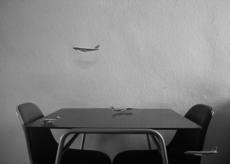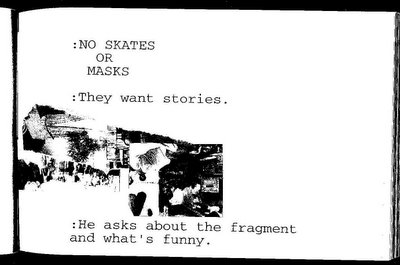Friday, January 27, 2006
Saturday, January 21, 2006
A Presentation Out of Space
In the past, my own past, I wasn’t a reader of Robert Duncan because, for some reason, I didn’t need to be, but now I do and I am. It is as much a pleasure to be able to read a whole body of work for the first time in middle age, as it is to read younger writers (and contemporaries) whose work I can watch become fully formed before my eyes. Acknowledging the influence and engagement of other writers has, from the beginning, been part of A Tonalist as a project.
To answer your question, Patrick, possibly there is no a tonalism, though, certainly, there are a tonalists. Atonality is known to exist and I would think, yes, there is a tonality. If one imagines a movement or a tendency in writing it becomes altered, used, empowered etc by those who consider it or consider themselves to be it. That’s the best part.
The Martian issue is vexed. Why did I suggest a Martian as an interlocutor when Martians are quite real to me as imaginary and unwilling participants in an endless war? (As you know, they take this form in my Ultravioleta, a science fiction novel or poem -- just now in the process of being published by Atelos.) How can one explain anything to a Martian? They are so preoccupied.
My reading of Robert Duncan this morning entirely corroborates your point about Color Music. "It is at once/a presentation out of space/ awakening a spiritual enormity, and still,/the sounding of a tone/ apart from any commitment to some scale." (“Everything Speaks to Me,” Duncan, Selected, p. 116.)
Color Music is a seminal a tonalist text. It was one of the books with which I found, as I began the project, I could prove to myself that it wasn’t just me, or just Norma and I, or only writers of our generation, who were writing in a way that I could identify as a tonalist – that is to say dissonant, strident, arch, sincere, ironic and lyric. It is an informed lyricism that resists itself. And then
“everyone’s suspicious/ aggrieved”. (Color Music, Durgin).
It is the watery part of fire. There is an emotional quality to it and also a clarity and abstraction that are very formal, not unlike Norma Cole’s drawings below.
Color Music is a multiple, subtle text and an unambiguously beautiful book, vividly white and red."abandoned on all sides/ by the snow" (Color Music, Durgin)
To close with Duncan -- literally the next poem I read this morning -- this passage suggests the kind of space or arrangement I imagine the idea of a tonality to be: "The household to provide shelter/ And to prepare its members/to live well even//in atonality setting free/ rearrangement of atonement,/ daily new keys in dreams,/reappearances of the “home”/note in the melody. (from “The Household,” Robert Duncan, Selected, p.119)

In the past, my own past, I wasn’t a reader of Robert Duncan because, for some reason, I didn’t need to be, but now I do and I am. It is as much a pleasure to be able to read a whole body of work for the first time in middle age, as it is to read younger writers (and contemporaries) whose work I can watch become fully formed before my eyes. Acknowledging the influence and engagement of other writers has, from the beginning, been part of A Tonalist as a project.
To answer your question, Patrick, possibly there is no a tonalism, though, certainly, there are a tonalists. Atonality is known to exist and I would think, yes, there is a tonality. If one imagines a movement or a tendency in writing it becomes altered, used, empowered etc by those who consider it or consider themselves to be it. That’s the best part.
The Martian issue is vexed. Why did I suggest a Martian as an interlocutor when Martians are quite real to me as imaginary and unwilling participants in an endless war? (As you know, they take this form in my Ultravioleta, a science fiction novel or poem -- just now in the process of being published by Atelos.) How can one explain anything to a Martian? They are so preoccupied.
My reading of Robert Duncan this morning entirely corroborates your point about Color Music. "It is at once/a presentation out of space/ awakening a spiritual enormity, and still,/the sounding of a tone/ apart from any commitment to some scale." (“Everything Speaks to Me,” Duncan, Selected, p. 116.)
Color Music is a seminal a tonalist text. It was one of the books with which I found, as I began the project, I could prove to myself that it wasn’t just me, or just Norma and I, or only writers of our generation, who were writing in a way that I could identify as a tonalist – that is to say dissonant, strident, arch, sincere, ironic and lyric. It is an informed lyricism that resists itself. And then
“everyone’s suspicious/ aggrieved”. (Color Music, Durgin).
It is the watery part of fire. There is an emotional quality to it and also a clarity and abstraction that are very formal, not unlike Norma Cole’s drawings below.
Color Music is a multiple, subtle text and an unambiguously beautiful book, vividly white and red."abandoned on all sides/ by the snow" (Color Music, Durgin)
To close with Duncan -- literally the next poem I read this morning -- this passage suggests the kind of space or arrangement I imagine the idea of a tonality to be: "The household to provide shelter/ And to prepare its members/to live well even//in atonality setting free/ rearrangement of atonement,/ daily new keys in dreams,/reappearances of the “home”/note in the melody. (from “The Household,” Robert Duncan, Selected, p.119)

Tuesday, January 17, 2006
Saturday, January 14, 2006
The Dream of Names
“The crystal was white, yellow, silver, blank.
Transparence a matter of slowly mattering, coming
to focus under sun under thumb. You never
see beyond but through.”
From The Crystal Text, Clark Coolidge
Lunch with Clark Coolidge and Michael Gizzi yesterday. Today reading Robert Duncan and Alli Warren. Duncan’s Oyez chapbook Of the War: Passages 22-27.
Dream of names at the MLA: Brent Cunningham and Patrick Durgin in the SPD booth. Patrick’s collection of ties. Constant visits by Aldon Nielsen. Juliana Spahr in the bar. Finally meeting Shanxing Wang author of Mad Science in Imperial City. Seeing him pour over Chinese Sun by Arkadii Dragomoschenko. Running into Tyrone Williams in the hotel copy place. Next night the reading. Saturnian presence of Rod Smith at the reading and in the exhibitors hall, seeming, like all of us, a spy in the house of love.
Joshua Clover in the lobby of the hotel on the last day advising us what to do with our last hours in DC. Going to Hirshhorn Museum on his advice. Running into Brian McHale as we came in and then Tom Orange, (both of them enamored of the Ann Hamilton installation there), Stephen Cope, Catherine Taylor and Bill Howe. Seeing (in a dazed somnabulent state) amazing videos by Hiraki Sawa in which something that moves (goats, planes, a caravan) is laid over daily life in the apartment.

“You never see beyond but through.” & every word of the poem rings true.
“The crystal was white, yellow, silver, blank.
Transparence a matter of slowly mattering, coming
to focus under sun under thumb. You never
see beyond but through.”
From The Crystal Text, Clark Coolidge
Lunch with Clark Coolidge and Michael Gizzi yesterday. Today reading Robert Duncan and Alli Warren. Duncan’s Oyez chapbook Of the War: Passages 22-27.
Dream of names at the MLA: Brent Cunningham and Patrick Durgin in the SPD booth. Patrick’s collection of ties. Constant visits by Aldon Nielsen. Juliana Spahr in the bar. Finally meeting Shanxing Wang author of Mad Science in Imperial City. Seeing him pour over Chinese Sun by Arkadii Dragomoschenko. Running into Tyrone Williams in the hotel copy place. Next night the reading. Saturnian presence of Rod Smith at the reading and in the exhibitors hall, seeming, like all of us, a spy in the house of love.
Joshua Clover in the lobby of the hotel on the last day advising us what to do with our last hours in DC. Going to Hirshhorn Museum on his advice. Running into Brian McHale as we came in and then Tom Orange, (both of them enamored of the Ann Hamilton installation there), Stephen Cope, Catherine Taylor and Bill Howe. Seeing (in a dazed somnabulent state) amazing videos by Hiraki Sawa in which something that moves (goats, planes, a caravan) is laid over daily life in the apartment.

“You never see beyond but through.” & every word of the poem rings true.
Thursday, January 12, 2006
Crystal's birthday.
"What are you doing with yourself?"
"It goes without saying that it is a long time since I have been any use for the fire."
She lived through Revolution, revelation ...
Pale as straw, estranged from kin,
never called an angel by anyway anyone ...
La Vie Mode d'Emploi.
"some of my friends" "squall lines"
"Reunited in the shadow of the pines."
"What are you doing with yourself?"
"It goes without saying that it is a long time since I have been any use for the fire."
She lived through Revolution, revelation ...
Pale as straw, estranged from kin,
never called an angel by anyway anyone ...
La Vie Mode d'Emploi.
"some of my friends" "squall lines"
"Reunited in the shadow of the pines."




